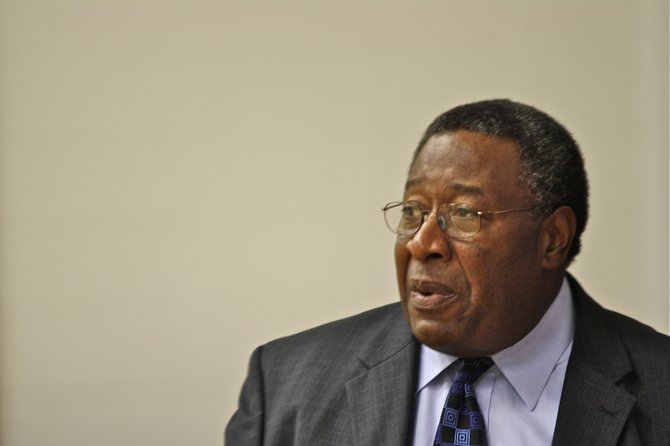Primus Wheeler, executive director of the Jackson Medical Mall, and his partners will present a strategic plan for the health-care corridor Sept. 19 at the Medical Mall. Photo by Jacob Fuller.
JACKSON — The Jackson Medical Mall and its partners are almost ready to present a completed strategic plan for the Jackson Health-Care Corridor to the public.
Jackson Medical Mall Executive Director Primus Wheeler told audience members at a Jackson 2000 luncheon Aug. 8 that the plan, developed by Jackson-based AJA Management, puts Jackson ahead of Flowood in the move to build a health-care corridor that could span from the Jackson-Evers International Airport to the Jackson Municipal Airport at Hawkins Field.
AJA set out to research three main points for the study, Wheeler told the Jackson Free Press. The first was to define the boundaries of the health-care corridor. The original plan ran along Woodrow Wilson Avenue, from Interstate 55 in the east to Interstate 220 in the west.
Last spring, the state Legislature passed the Mississippi Health Care Industry Zone Act, giving the Mississippi Development Authority the ability to dedicate "health-care zones." Inside those zones, certain businesses, including clinics, medical-supply manufacturers and retailers and telecommunication companies, will be eligible for tax breaks and incentives.
Wheeler said Gov. Phil Bryant asked why the corridor should only be located between the interstates. Instead, the governor proposed that the corridor stretch from Jackson-Medgar Wiley Evers International Airport to the Jackson Municipal Airport at Hawkins Field. That area would include a long stretch through Flowood.
The Jackson Medical Mall, along with its partners at the University of Mississippi Medical Center, have not studied the possibilities of extending the corridor to Flowood, only the area between Interstates 55 and 220. While other groups will likely begin working on a plan for the corridor in Flowood, Wheeler and his colleagues are focusing on the area around what will be the corridor's centerpiece: UMMC.
Secondly, AJA set out to see what assets and businesses in the area need to be enhanced and improved for the corridor. Duane O'Neill, Greater Jackson Chamber Partnership president and CEO, said the entire area needs to be a visually pleasing and pleasant place to visit for the corridor to reach its goal of becoming a destination for people from across the southeastern United States in need of health care.
"Aesthetics is a top priority," O'Neill told the JFP Aug. 13.
Lastly, the plan is supposed to describe the surrounding infrastructure and what improvements the city should make for the health-care corridor to become a reality.
Mayor Harvey Johnson Jr. assigned Sean Perkins, his chief of staff, to the strategic-planning committee for the corridor. Wheeler said the city cannot commit to any overall infrastructure plans, but has agreed to help when it can on a project-by-project basis.
Wheeler said the increased size of the corridor, and expanding it beyond Jackson, made it more important for the steering committee to get a strategic plan in place. That plan will help bring prospective companies to Jackson, instead of going to Rankin county, which has shown an ability to draw businesses, including retail and manufacturing, away from Jackson in recent years.
UMMC's influence and public funding, along with the two-year head start in planning that its leaders and the Jackson Medical Mall have on anyone making plans for a corridor in Flowood give Jackson a major advantage in any competition that may arise between the cities.
The committee--made up of representatives of the Jackson Medical Mall, University of Mississippi Medical Center, local neighborhood associations and several other Jackson organizations--will present its plan at a meeting of community partners at the Jackson Medical Mall Sept. 19 at 3:30 p.m. Lindsay Buford, the Greater Jackson Chamber Partnership vice president of health-care initiatives, told the JFP that the committee will give updates on its plan and its funding efforts, say which organizations need to be involved and lay out the next steps toward completing the corridor.
The meeting will last about one hour, she said, and is open to anyone with a vested interest in the corridor.
Inside the MDA-dedicated health-care zone, businesses will be eligible for an accelerated state income-tax depreciation deduction, which will allow them to recover the cost of the depreciated value of property such as buildings, machinery, vehicles and other equipment, as well as intangible property such as copyrights and computer software. The accelerated rate will allow a deduction equivalent to a 10-year depreciation instead of the regular one-year rate.
The health-care zone companies can also apply for certain sales-tax exemptions and a local property-tax exemption, which excludes taxes used for public school-district purposes and taxes on vehicles used on state highways.
A qualified private company with a minimum capital investment of $100 million can qualify to pay a fee of no less than one-third of its property-tax levy in lieu of paying those ad valorem taxes. The funds will be divided between the municipality, county and school district.
Businesses will receive any awarded tax incentives for a period not to exceed 10 years.
To qualify, eligible businesses must create a minimum of 25 full-time jobs. If they fail to do so, they can lose their tax exemptions after a period of five years.
Once MDA creates a health-care zone, county boards of supervisors or municipality governments can grant the tax exemptions.
Jackson Health-Care Corridor: The Players
Gov. Phil Bryant
Mississippi State Legislature
Mississippi Development Authority
University of Mississippi Medical Center
Jackson State University
Greater Jackson Chamber Partnership
Jackson Medical Mall
Jackson-Hinds Comprehensive Health Center
AJA Management



Comments
Use the comment form below to begin a discussion about this content.
comments powered by Disqus